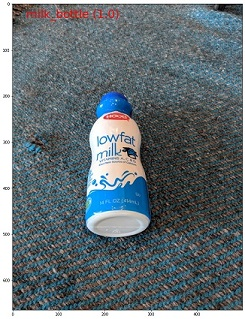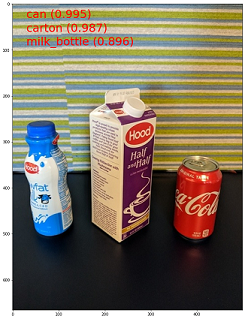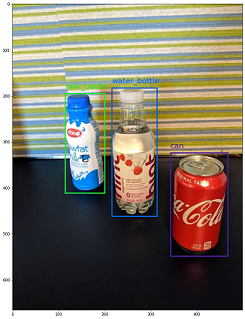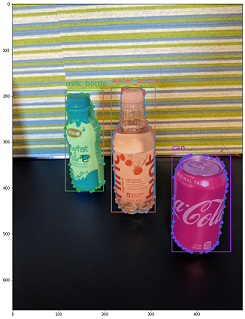- 第2章 IMS架构、网元、接口
- 踩坑笔记 Spring websocket并发发送消息异常
- Spring Boot @Autowired注入为空的原因及解决方法
- MySQL8.0.32详细安装教程(奶妈级手把手教你安装)
- Tomcat配置环境变量(超详细)
- SpringBoot版本与Spring、java、maven、grad
- HashMap扩容机制详解
- Docker从容器中项目如何访问到宿主机MYSQL
- Unity链接MySql数据库
- SpringBoot多环境配置,让你部署无忧
- SpringBoot下进行单元测试
- 【计算机毕业设计】鲜花销售管理系统
- springboot web创建失败,解决Could not find
- Kafka消费者详解
- 瑞吉外卖项目 基于spring Boot+mybatis-plus开发
- 解决1130-Host‘ ‘is not allowed to con
- 【SpringMVC】JSON注解&全局异常处理机制
- RabbitMQ延时队列的详细介绍以及Java代码实现
- SpringBoot调用第三方WebService接口的两种实现方式
- SSM框架与Springboot框架的区别
- 【文末送书】计算机网络编程 | epoll详解
- 基于Python的图书信息管理系统
- 【常见错误】org.springframework.web.multi
- 【SpringBoot系列】SpringBoot日志配置
- 【MySQL】MySQL的数据类型
- JAVAWEB学生信息管理系统保姆级教程(增删改查+登录注册+Filt
- Java8使用stream流给List<Map<String,Obje
- OpenAI开发系列(二):大语言模型发展史及Transformer架
- 群晖折腾记1—群晖NAS使用docker中的ddns-go,DDNS阿
- JavaEE(SpringMVC)期末复习(选择+填空+解答)
目录
- 一、用于训练的数据架构
- 图像分类(二进制/多类)
- 多标签图像分类
- 对象检测
- 实例分段
- 二、用于联机评分的数据架构
- 输入格式
- 输出格式
- 图像分类(二进制/多类)
- 多标签图像分类
- 对象检测
- 实例分段
- 在线评分和可解释性 (XAI) 的数据格式
- 支持的可解释性方法:
- 输入格式 (XAI)
- 输出格式 (XAI)
- 图像分类(二进制/多类)
- 多标签图像分类
- 对象检测
- 实例分段
了解如何设置Azure Machine Learning JSONL 文件格式,以便在训练和推理期间在计算机视觉任务的自动化 ML 实验中使用数据。
关注TechLead,分享AI全维度知识。作者拥有10+年互联网服务架构、AI产品研发经验、团队管理经验,同济本复旦硕,复旦机器人智能实验室成员,阿里云认证的资深架构师,项目管理专业人士,上亿营收AI产品研发负责人。

一、用于训练的数据架构
Azure 机器学习的图像 AutoML 要求以 JSONL(JSON 行)格式准备输入图像数据。 本部分介绍多类图像分类、多标签图像分类、对象检测和实例分段的输入数据格式或架构。 我们还将提供最终训练或验证 JSON 行文件的示例。
图像分类(二进制/多类)
每个 JSON 行中的输入数据格式/架构:
{ "image_url":"azureml://subscriptions//resourcegroups/ /workspaces/ /datastores/ /paths/ ", "image_details":{ "format":"image_format", "width":"image_width", "height":"image_height" }, "label":"class_name", } 密钥 说明 示例 image_url Azure 机器学习数据存储中的图像位置。 my-subscription-id 需要替换为图像所在的 Azure 订阅。 若要详细了解 Azure 订阅,请单击此处。 类似地,my-resource-group、my-workspace、my-datastore 应分别替换为资源组名称、工作区名称和数据存储名称。 path_to_image 应该是图像在数据存储上的完整路径。 Required, String "azureml://subscriptions/my-subscription-id/resourcegroups/my-resource-group/workspaces/my-workspace/datastores/my-datastore/paths/image_data/Image_01.jpg" image_details 图像详细信息 Optional, Dictionary "image_details":{"format": "jpg", "width": "400px", "height": "258px"} format 图像类型(支持 Pillow 库中所有可用的图像格式) Optional, String from {"jpg", "jpeg", "png", "jpe", "jfif","bmp", "tif", "tiff"} "jpg" or "jpeg" or "png" or "jpe" or "jfif" or "bmp" or "tif" or "tiff" width 图像的宽度 Optional, String or Positive Integer "400px" or 400 height 图像的高度 Optional, String or Positive Integer "200px" or 200 label 图像的类/标签 Required, String "cat" 多类图像分类的 JSONL 文件示例:
{"image_url": "azureml://subscriptions/my-subscription-id/resourcegroups/my-resource-group/workspaces/my-workspace/datastores/my-datastore/paths/image_data/Image_01.jpg", "image_details":{"format": "jpg", "width": "400px", "height": "258px"}, "label": "can"} {"image_url": "azureml://subscriptions/my-subscription-id/resourcegroups/my-resource-group/workspaces/my-workspace/datastores/my-datastore/paths/image_data/Image_02.jpg", "image_details": {"format": "jpg", "width": "397px", "height": "296px"}, "label": "milk_bottle"} . . . {"image_url": "azureml://subscriptions/my-subscription-id/resourcegroups/my-resource-group/workspaces/my-workspace/datastores/my-datastore/paths/image_data/Image_n.jpg", "image_details": {"format": "jpg", "width": "1024px", "height": "768px"}, "label": "water_bottle"}
多标签图像分类
下面是每个 JSON 行中用于图像分类的输入数据格式/架构示例。
{ "image_url":"azureml://subscriptions//resourcegroups/ /workspaces/ /datastores/ /paths/ ", "image_details":{ "format":"image_format", "width":"image_width", "height":"image_height" }, "label":[ "class_name_1", "class_name_2", "class_name_3", "...", "class_name_n" ] } 密钥 说明 示例 image_url Azure 机器学习数据存储中的图像位置。 my-subscription-id 需要替换为图像所在的 Azure 订阅。 若要详细了解 Azure 订阅,请单击此处。 类似地,my-resource-group、my-workspace、my-datastore 应分别替换为资源组名称、工作区名称和数据存储名称。 path_to_image 应该是图像在数据存储上的完整路径。 Required, String "azureml://subscriptions/my-subscription-id/resourcegroups/my-resource-group/workspaces/my-workspace/datastores/my-datastore/paths/image_data/Image_01.jpg" image_details 图像详细信息 Optional, Dictionary "image_details":{"format": "jpg", "width": "400px", "height": "258px"} format 图像类型(支持 Pillow 库中所有可用的图像格式) Optional, String from {"jpg", "jpeg", "png", "jpe", "jfif", "bmp", "tif", "tiff"} "jpg" or "jpeg" or "png" or "jpe" or "jfif" or "bmp" or "tif" or "tiff" width 图像的宽度 Optional, String or Positive Integer "400px" or 400 height 图像的高度 Optional, String or Positive Integer "200px" or 200 label 图像中的类/标签列表 Required, List of Strings ["cat","dog"] 多标签图像分类的 JSONL 文件示例:
{"image_url": "azureml://subscriptions/my-subscription-id/resourcegroups/my-resource-group/workspaces/my-workspace/datastores/my-datastore/paths/image_data/Image_01.jpg", "image_details":{"format": "jpg", "width": "400px", "height": "258px"}, "label": ["can"]} {"image_url": "azureml://subscriptions/my-subscription-id/resourcegroups/my-resource-group/workspaces/my-workspace/datastores/my-datastore/paths/image_data/Image_02.jpg", "image_details": {"format": "jpg", "width": "397px", "height": "296px"}, "label": ["can","milk_bottle"]} . . . {"image_url": "azureml://subscriptions/my-subscription-id/resourcegroups/my-resource-group/workspaces/my-workspace/datastores/my-datastore/paths/image_data/Image_n.jpg", "image_details": {"format": "jpg", "width": "1024px", "height": "768px"}, "label": ["carton","milk_bottle","water_bottle"]}
对象检测
下面是用于对象检测的示例 JSONL 文件。
{ "image_url":"azureml://subscriptions//resourcegroups/ /workspaces/ /datastores/ /paths/ ", "image_details":{ "format":"image_format", "width":"image_width", "height":"image_height" }, "label":[ { "label":"class_name_1", "topX":"xmin/width", "topY":"ymin/height", "bottomX":"xmax/width", "bottomY":"ymax/height", "isCrowd":"isCrowd" }, { "label":"class_name_2", "topX":"xmin/width", "topY":"ymin/height", "bottomX":"xmax/width", "bottomY":"ymax/height", "isCrowd":"isCrowd" }, "..." ] } 其中:
- xmin = 边界框左上角的 x 坐标
- ymin = 边界框左上角的 y 坐标
- xmax = 边界框右下角的 x 坐标
- ymax = 边界框右下角的 y 坐标
密钥 说明 示例 image_url Azure 机器学习数据存储中的图像位置。 my-subscription-id 需要替换为图像所在的 Azure 订阅。 若要详细了解 Azure 订阅,请单击此处。 类似地,my-resource-group、my-workspace、my-datastore 应分别替换为资源组名称、工作区名称和数据存储名称。 path_to_image 应该是图像在数据存储上的完整路径。 Required, String "azureml://subscriptions/my-subscription-id/resourcegroups/my-resource-group/workspaces/my-workspace/datastores/my-datastore/paths/image_data/Image_01.jpg" image_details 图像详细信息 Optional, Dictionary "image_details":{"format": "jpg", "width": "400px", "height": "258px"} format 图像类型(支持 Pillow 库中提供的所有图像格式。但对于 YOLO,仅支持 opencv 允许的图像格式) Optional, String from {"jpg", "jpeg", "png", "jpe", "jfif", "bmp", "tif", "tiff"} "jpg" or "jpeg" or "png" or "jpe" or "jfif" or "bmp" or "tif" or "tiff" width 图像的宽度 Optional, String or Positive Integer "499px" or 499 height 图像的高度 Optional, String or Positive Integer "665px" or 665 label(外部键) 边界框列表,其中每个框都是其左上方和右下方坐标的 label, topX, topY, bottomX, bottomY, isCrowd 字典 Required, List of dictionaries [{"label": "cat", "topX": 0.260, "topY": 0.406, "bottomX": 0.735, "bottomY": 0.701, "isCrowd": 0}] label(内部键) 边界框中对象的类/标签 Required, String "cat" topX 边界框左上角的 x 坐标与图像宽度的比率 Required, Float in the range [0,1] 0.260 topY 边界框左上角的 y 坐标与图像高度的比率 Required, Float in the range [0,1] 0.406 bottomX 边界框右下角的 x 坐标与图像宽度的比率 Required, Float in the range [0,1] 0.735 bottomY 边界框右下角的 y 坐标与图像高度的比率 Required, Float in the range [0,1] 0.701 isCrowd 指示边界框是否围绕对象群。 如果设置了此特殊标志,我们在计算指标时将跳过此特定边界框。 Optional, Bool 0 用于对象检测的 JSONL 文件示例:
{"image_url": "azureml://subscriptions/my-subscription-id/resourcegroups/my-resource-group/workspaces/my-workspace/datastores/my-datastore/paths/image_data/Image_01.jpg", "image_details": {"format": "jpg", "width": "499px", "height": "666px"}, "label": [{"label": "can", "topX": 0.260, "topY": 0.406, "bottomX": 0.735, "bottomY": 0.701, "isCrowd": 0}]} {"image_url": "azureml://subscriptions/my-subscription-id/resourcegroups/my-resource-group/workspaces/my-workspace/datastores/my-datastore/paths/image_data/Image_02.jpg", "image_details": {"format": "jpg", "width": "499px", "height": "666px"}, "label": [{"label": "carton", "topX": 0.172, "topY": 0.153, "bottomX": 0.432, "bottomY": 0.659, "isCrowd": 0}, {"label": "milk_bottle", "topX": 0.300, "topY": 0.566, "bottomX": 0.891, "bottomY": 0.735, "isCrowd": 0}]} . . . {"image_url": "azureml://subscriptions/my-subscription-id/resourcegroups/my-resource-group/workspaces/my-workspace/datastores/my-datastore/paths/image_data/Image_n.jpg", "image_details": {"format": "jpg", "width": "499px", "height": "666px"}, "label": [{"label": "carton", "topX": 0.0180, "topY": 0.297, "bottomX": 0.380, "bottomY": 0.836, "isCrowd": 0}, {"label": "milk_bottle", "topX": 0.454, "topY": 0.348, "bottomX": 0.613, "bottomY": 0.683, "isCrowd": 0}, {"label": "water_bottle", "topX": 0.667, "topY": 0.279, "bottomX": 0.841, "bottomY": 0.615, "isCrowd": 0}]}
实例分段
对于实例分段,自动化 ML 仅支持多边形作为输入和输出,不支持掩码。
下面是实例分段的示例 JSONL 文件。
{ "image_url":"azureml://subscriptions//resourcegroups/ /workspaces/ /datastores/ /paths/ ", "image_details":{ "format":"image_format", "width":"image_width", "height":"image_height" }, "label":[ { "label":"class_name", "isCrowd":"isCrowd", "polygon":[["x1", "y1", "x2", "y2", "x3", "y3", "...", "xn", "yn"]] } ] } 密钥 说明 示例 image_url Azure 机器学习数据存储中的图像位置。 my-subscription-id 需要替换为图像所在的 Azure 订阅。 若要详细了解 Azure 订阅,请单击此处。 类似地,my-resource-group、my-workspace、my-datastore 应分别替换为资源组名称、工作区名称和数据存储名称。 path_to_image 应该是图像在数据存储上的完整路径。 Required, String "azureml://subscriptions/my-subscription-id/resourcegroups/my-resource-group/workspaces/my-workspace/datastores/my-datastore/paths/image_data/Image_01.jpg" image_details 图像详细信息 Optional, Dictionary "image_details":{"format": "jpg", "width": "400px", "height": "258px"} format 映像类型 Optional, String from {"jpg", "jpeg", "png", "jpe", "jfif", "bmp", "tif", "tiff" } "jpg" or "jpeg" or "png" or "jpe" or "jfif" or "bmp" or "tif" or "tiff" width 图像的宽度 Optional, String or Positive Integer "499px" or 499 height 图像的高度 Optional, String or Positive Integer "665px" or 665 label(外部键) 掩码列表,其中每个掩码都是 label, isCrowd, polygon coordinates 的字典 Required, List of dictionaries [{"label": "can", "isCrowd": 0, "polygon": [[0.577, 0.689, 0.562, 0.681, 0.559, 0.686]]}] label(内部键) 掩码中对象的类/标签 Required, String "cat" isCrowd 指示掩码是否围绕对象群 Optional, Bool 0 polygon 对象的多边形坐标 Required, List of list for multiple segments of the same instance. Float values in the range [0,1] [[0.577, 0.689, 0.567, 0.689, 0.559, 0.686]] 实例分段的 JSONL 文件示例:
{"image_url": "azureml://subscriptions/my-subscription-id/resourcegroups/my-resource-group/workspaces/my-workspace/datastores/my-datastore/paths/image_data/Image_01.jpg", "image_details": {"format": "jpg", "width": "499px", "height": "666px"}, "label": [{"label": "can", "isCrowd": 0, "polygon": [[0.577, 0.689, 0.567, 0.689, 0.559, 0.686, 0.380, 0.593, 0.304, 0.555, 0.294, 0.545, 0.290, 0.534, 0.274, 0.512, 0.2705, 0.496, 0.270, 0.478, 0.284, 0.453, 0.308, 0.432, 0.326, 0.423, 0.356, 0.415, 0.418, 0.417, 0.635, 0.493, 0.683, 0.507, 0.701, 0.518, 0.709, 0.528, 0.713, 0.545, 0.719, 0.554, 0.719, 0.579, 0.713, 0.597, 0.697, 0.621, 0.695, 0.629, 0.631, 0.678, 0.619, 0.683, 0.595, 0.683, 0.577, 0.689]]}]} {"image_url": "azureml://subscriptions/my-subscription-id/resourcegroups/my-resource-group/workspaces/my-workspace/datastores/my-datastore/paths/image_data/Image_02.jpg", "image_details": {"format": "jpg", "width": "499px", "height": "666px"}, "label": [{"label": "carton", "isCrowd": 0, "polygon": [[0.240, 0.65, 0.234, 0.654, 0.230, 0.647, 0.210, 0.512, 0.202, 0.403, 0.182, 0.267, 0.184, 0.243, 0.180, 0.166, 0.186, 0.159, 0.198, 0.156, 0.396, 0.162, 0.408, 0.169, 0.406, 0.217, 0.414, 0.249, 0.422, 0.262, 0.422, 0.569, 0.342, 0.569, 0.334, 0.572, 0.320, 0.585, 0.308, 0.624, 0.306, 0.648, 0.240, 0.657]]}, {"label": "milk_bottle", "isCrowd": 0, "polygon": [[0.675, 0.732, 0.635, 0.731, 0.621, 0.725, 0.573, 0.717, 0.516, 0.717, 0.505, 0.720, 0.462, 0.722, 0.438, 0.719, 0.396, 0.719, 0.358, 0.714, 0.334, 0.714, 0.322, 0.711, 0.312, 0.701, 0.306, 0.687, 0.304, 0.663, 0.308, 0.630, 0.320, 0.596, 0.32, 0.588, 0.326, 0.579]]}]} . . . {"image_url": "azureml://subscriptions/my-subscription-id/resourcegroups/my-resource-group/workspaces/my-workspace/datastores/my-datastore/paths/image_data/Image_n.jpg", "image_details": {"format": "jpg", "width": "499px", "height": "666px"}, "label": [{"label": "water_bottle", "isCrowd": 0, "polygon": [[0.334, 0.626, 0.304, 0.621, 0.254, 0.603, 0.164, 0.605, 0.158, 0.602, 0.146, 0.602, 0.142, 0.608, 0.094, 0.612, 0.084, 0.599, 0.080, 0.585, 0.080, 0.539, 0.082, 0.536, 0.092, 0.533, 0.126, 0.530, 0.132, 0.533, 0.144, 0.533, 0.162, 0.525, 0.172, 0.525, 0.186, 0.521, 0.196, 0.521 ]]}, {"label": "milk_bottle", "isCrowd": 0, "polygon": [[0.392, 0.773, 0.380, 0.732, 0.379, 0.767, 0.367, 0.755, 0.362, 0.735, 0.362, 0.714, 0.352, 0.644, 0.352, 0.611, 0.362, 0.597, 0.40, 0.593, 0.444, 0.494, 0.588, 0.515, 0.585, 0.621, 0.588, 0.671, 0.582, 0.713, 0.572, 0.753 ]]}]}
二、用于联机评分的数据架构
在本部分中,我们将记录在使用部署的模型时进行预测所需的输入数据格式。
输入格式
以下 JSON 是使用特定于任务的模型终结点对任何任务生成预测所需的输入格式。
{ "input_data": { "columns": [ "image" ], "data": [ "image_in_base64_string_format" ] } }此 json 为具有外部键 input_data 和内部键 columns、data 的字典,如下表所述。 终结点接受采用上述格式的 json 字符串,并将其转换为评分脚本所需的示例的数据帧。 Json 的 request_json["input_data"]["data"] 部分中的每个输入图像都是 base64 编码字符串。
密钥 说明 input_data (外部键) 它是 json 请求中的外部键。 input_data 是接受输入图像示例的字典 Required, Dictionary columns (内部键) 用于创建数据帧的列名。 它仅接受一个列名为 image 的列。 Required, List data (内部键) Base64 编码图像列表 Required, List 部署 mlflow 模型后,我们可以使用以下代码段来获取所有任务的预测。
# Create request json import base64 sample_image = os.path.join(dataset_dir, "images", "1.jpg") def read_image(image_path): with open(image_path, "rb") as f: return f.read() request_json = { "input_data": { "columns": ["image"], "data": [base64.encodebytes(read_image(sample_image)).decode("utf-8")], } }import json request_file_name = "sample_request_data.json" with open(request_file_name, "w") as request_file: json.dump(request_json, request_file)resp = ml_client.online_endpoints.invoke( endpoint_name=online_endpoint_name, deployment_name=deployment.name, request_file=request_file_name, )输出格式
根据任务类型,对模型终结点进行的预测遵循不同的结构。 本部分将探讨多类、多标签图像分类、对象检测和实例分段任务的输出数据格式。
当输入请求包含一个图像时,以下架构适用。
图像分类(二进制/多类)
图像分类的终结点返回数据集中的所有标签及其在输入图像中的概率分数,格式如下: visualizations 和 attributions 与可解释性相关,并且当请求仅用于评分时,输出中将不会包括这些键。 有关图像分类的可解释性输入和输出架构的详细信息,请参阅[图像分类的可解释性部分]。
[ { "probs": [ 2.098e-06, 4.783e-08, 0.999, 8.637e-06 ], "labels": [ "can", "carton", "milk_bottle", "water_bottle" ] } ]多标签图像分类
对于多标签图像分类,模型终结点返回标签及其概率。 visualizations 和 attributions 与可解释性相关,并且当请求仅用于评分时,输出中将不会包括这些键。 有关多标签分类的可解释性输入和输出架构的详细信息,请参阅[图像分类多标签的可解释性部分]。
[ { "probs": [ 0.997, 0.960, 0.982, 0.025 ], "labels": [ "can", "carton", "milk_bottle", "water_bottle" ] } ]对象检测
对象检测模型返回多个框,其中包含缩放后的左上角和右下角坐标,以及框标签和置信度分数。
[ { "boxes": [ { "box": { "topX": 0.224, "topY": 0.285, "bottomX": 0.399, "bottomY": 0.620 }, "label": "milk_bottle", "score": 0.937 }, { "box": { "topX": 0.664, "topY": 0.484, "bottomX": 0.959, "bottomY": 0.812 }, "label": "can", "score": 0.891 }, { "box": { "topX": 0.423, "topY": 0.253, "bottomX": 0.632, "bottomY": 0.725 }, "label": "water_bottle", "score": 0.876 } ] } ]实例分段
在实例分段中,输出包含多个框,其中包含缩放后的左上角和右下角坐标、标签、置信度和多边形(非掩码)。 此处,多边形值与我们在[架构部分]中讨论的格式相同。
[ { "boxes": [ { "box": { "topX": 0.679, "topY": 0.491, "bottomX": 0.926, "bottomY": 0.810 }, "label": "can", "score": 0.992, "polygon": [ [ 0.82, 0.811, 0.771, 0.810, 0.758, 0.805, 0.741, 0.797, 0.735, 0.791, 0.718, 0.785, 0.715, 0.778, 0.706, 0.775, 0.696, 0.758, 0.695, 0.717, 0.698, 0.567, 0.705, 0.552, 0.706, 0.540, 0.725, 0.520, 0.735, 0.505, 0.745, 0.502, 0.755, 0.493 ] ] }, { "box": { "topX": 0.220, "topY": 0.298, "bottomX": 0.397, "bottomY": 0.601 }, "label": "milk_bottle", "score": 0.989, "polygon": [ [ 0.365, 0.602, 0.273, 0.602, 0.26, 0.595, 0.263, 0.588, 0.251, 0.546, 0.248, 0.501, 0.25, 0.485, 0.246, 0.478, 0.245, 0.463, 0.233, 0.442, 0.231, 0.43, 0.226, 0.423, 0.226, 0.408, 0.234, 0.385, 0.241, 0.371, 0.238, 0.345, 0.234, 0.335, 0.233, 0.325, 0.24, 0.305, 0.586, 0.38, 0.592, 0.375, 0.598, 0.365 ] ] }, { "box": { "topX": 0.433, "topY": 0.280, "bottomX": 0.621, "bottomY": 0.679 }, "label": "water_bottle", "score": 0.988, "polygon": [ [ 0.576, 0.680, 0.501, 0.680, 0.475, 0.675, 0.460, 0.625, 0.445, 0.630, 0.443, 0.572, 0.440, 0.560, 0.435, 0.515, 0.431, 0.501, 0.431, 0.433, 0.433, 0.426, 0.445, 0.417, 0.456, 0.407, 0.465, 0.381, 0.468, 0.327, 0.471, 0.318 ] ] } ] } ]在线评分和可解释性 (XAI) 的数据格式
本部分阐述了在使用部署的模型时进行预测并为预测的类生成解释所需的输入数据格式。 无需单独部署即可生成解释。 在线评分的相同终结点可用于生成解释。 我们只需要在输入架构中传递一些额外的可解释性相关参数即可获得解释和/或属性分数矩阵(像素级解释)的可视化效果。
支持的可解释性方法:
- XRAI (xrai)
- 集成渐变 (integrated_gradients)
- 引导式 GradCAM (guided_gradcam)
- 引导式反向传播 (guided_backprop)
输入格式 (XAI)
支持以下输入格式,以使用特定于任务的模型终结点生成对任何分类任务的预测和解释。 部署模型后,我们可以使用以下架构来获取预测和解释。
{ "input_data": { "columns": ["image"], "data": [json.dumps({"image_base64": "image_in_base64_string_format", "model_explainability": True, "xai_parameters": {} }) ] } }除了图像,输入架构中还需要两个额外的参数(model_explainability 和 xai_parameters)才能生成解释。
密钥 说明 默认值 image_base64 base64 格式的输入图像 Required, String - model_explainability 是生成解释还是仅生成评分 Optional, Bool False xai_parameters 如果 model_explainability 为 True,则 xai_parameters 是一个字典,其中包含可解释性算法相关参数,并以 xai_algorithm、visualizations、attributions 为键。 Optional, Dictionary 如果未传递 xai_parameters,则使用 xrai 可解释性算法及其默认值 {"xai_algorithm": "xrai", "visualizations": True, "attributions": False} xai_algorithm 要使用的可解释性算法的名称。 支持的 XAI 算法为 {xrai, integrated_gradients, guided_gradcam, guided_backprop} Optional, String xrai visualizations 是否返回解释的可视化效果。 Optional, Bool True attributions 是否返回特征属性。 Optional, Bool False confidence_score_threshold_multilabel 置信度分数阈值,用于选择顶级类以生成多标签分类中的解释。 Optional, Float 0.5 下表描述了可解释性支持的架构。
类型 架构 对 base64 格式的单个图像进行推理 以 image_base64 为键和值的字典是 base64 编码的图像, model_explainability 键具有 True 或 False,xai_parameters 字典具有 XAI 算法特定参数 Required, Json String Works for one or more images request_json 中的每个输入图像(在以下代码中定义)都是附加到列表 request_json["input_data"]["data"] 的 base64 编码字符串:
import base64 import json # Get the details for online endpoint endpoint = ml_client.online_endpoints.get(name=online_endpoint_name) sample_image = "./test_image.jpg" # Define explainability (XAI) parameters model_explainability = True xai_parameters = {"xai_algorithm": "xrai", "visualizations": True, "attributions": False} def read_image(image_path): with open(image_path, "rb") as f: return f.read() # Create request json request_json = { "input_data": { "columns": ["image"], "data": [json.dumps({"image_base64": base64.encodebytes(read_image(sample_image)).decode("utf-8"), "model_explainability": model_explainability, "xai_parameters": xai_parameters})], } } request_file_name = "sample_request_data.json" with open(request_file_name, "w") as request_file: json.dump(request_json, request_file) resp = ml_client.online_endpoints.invoke( endpoint_name=online_endpoint_name, deployment_name=deployment.name, request_file=request_file_name, ) predictions = json.loads(resp)输出格式 (XAI)
根据任务类型,对模型终结点进行的预测遵循不同的架构。 本部分介绍多类、多标签图像分类任务的输出数据格式。
以下架构是针对两个输入图像的情况定义的。
图像分类(二进制/多类)
除包含 visualizations 和 attributions 键值(如果这些键在请求中设为 True)以外,输出架构[与上述架构相同]。
如果在输入请求中将 model_explainability、visualizations 和 attributions 设置为 True,则输出将具有 visualizations 和 attributions。 下表解释了有关这些参数的更多详细信息。 将针对概率分数最高的类生成可视化效果和属性。
输出键 说明 visualizations base64 字符串格式的单个图像,类型为 Optional, String attributions 具有形状 [3, valid_crop_size, valid_crop_size] 像素级属性分数的多维数组 Optional, List [ { "probs": [ 0.006, 9.345e-05, 0.992, 0.003 ], "labels": [ "can", "carton", "milk_bottle", "water_bottle" ], "visualizations": "iVBORw0KGgoAAAAN.....", "attributions": [[[-4.2969e-04, -1.3090e-03, 7.7791e-04, ..., 2.6677e-04, -5.5195e-03, 1.7989e-03], . . . [-5.8236e-03, -7.9108e-04, -2.6963e-03, ..., 2.6517e-03, 1.2546e-03, 6.6507e-04]]] } ]多标签图像分类
与多类分类相比,多标签分类的输出架构的唯一区别是,每个图像中可以有多个类,可以为每个类生成解释。 因此,visualizations 是 base64 图像字符串的列表,attributions 是基于 confidence_score_threshold_multilabel(默认值为 0.5)的每个选定类的属性分数列表。
如果在输入请求中将 model_explainability、visualizations 和 attributions 设置为 True,则输出将具有 visualizations 和 attributions。 下表解释了有关这些参数的更多详细信息。 针对概率分数大于或等于 confidence_score_threshold_multilabel 的所有类生成可视化和属性。
输出键 说明 visualizations base64 字符串格式的图像列表,类型为 Optional, String attributions 多维数组列表,其中包含每个类的像素级属性分数,每个多维数组的形状为 [3, valid_crop_size, valid_crop_size] Optional, List 警告
在联机终终结点上生成解释时,请确保仅根据置信度分数选择几个类,以避免终结点上出现超时问题,或者将终结点与 GPU 实例类型一起使用。 要生成多标签分类中大量类的说明,请参阅批量评分笔记本 (SDK v1)。
[ { "probs": [ 0.994, 0.994, 0.843, 0.166 ], "labels": [ "can", "carton", "milk_bottle", "water_bottle" ], "visualizations": ["iVBORw0KGgoAAAAN.....", "iVBORw0KGgoAAAAN......", .....], "attributions": [ [[[-4.2969e-04, -1.3090e-03, 7.7791e-04, ..., 2.6677e-04, -5.5195e-03, 1.7989e-03], . . . [-5.8236e-03, -7.9108e-04, -2.6963e-03, ..., 2.6517e-03, 1.2546e-03, 6.6507e-04]]], . . . ] } ]对象检测
警告
XAI 不受支持。 因此只返回分数。 有关评分示例,请参阅[在线评分部分]。
实例分段
警告
XAI 不受支持。 因此只返回分数。 有关评分示例,请参阅[在线评分部分]。
关注TechLead,分享AI全维度知识。作者拥有10+年互联网服务架构、AI产品研发经验、团队管理经验,同济本复旦硕,复旦机器人智能实验室成员,阿里云认证的资深架构师,项目管理专业人士,上亿营收AI产品研发负责人。














